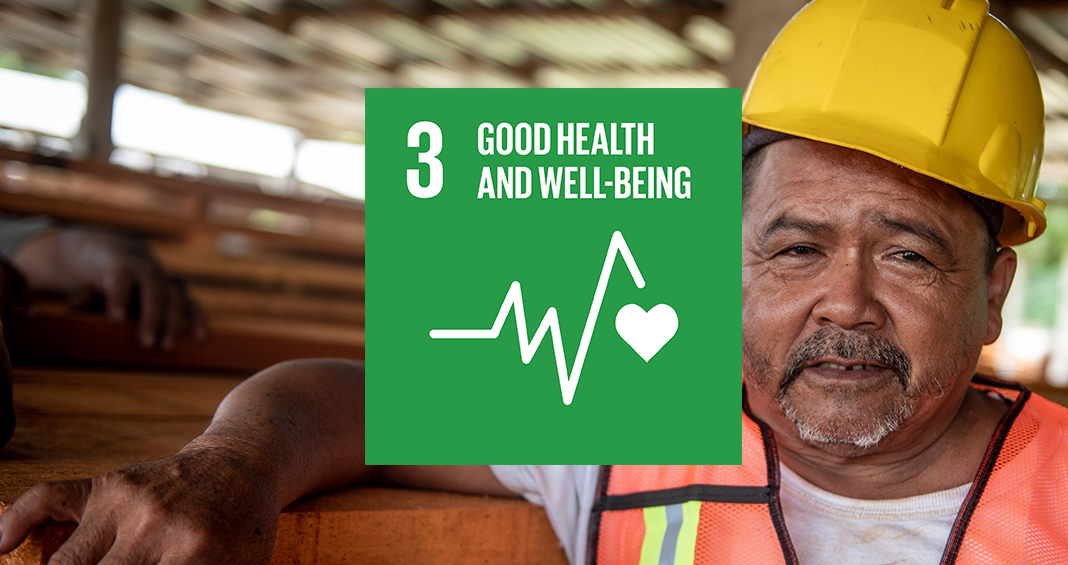We ensure safety in both forestry and in the upstream production chain
Ensuring healthy lives and promoting the well-being for all at all ages is essential to sustainable development. Significant strides have been made in increasing life expectancy and reducing some of the common killers associated with child and maternal mortality. Major progress has been made on increasing access to clean water and sanitation, reducing malaria, tuberculosis, polio and the spread of HIV/AIDS. However, many more efforts are needed.
Studies show that trees and forests are of significant benefit to people’s overall health and well-being. Besides basic ecosystem services, such as clean water and food, forests also provide many pharmaceutical products and traditional medicines. Research shows that forests and trees also positively affect the physical and mental health of individuals and populations.
Forests are a source of clean air as trees improve air quality by removing substantial amounts of pollution and, producing significant health benefits in both urban and rural areas. Wildfires are increasingly occurring in some regions, accelerated by forest clearing and degradation and climate change. The smog from these fires can spread thousands of miles and the air pollution it creates is connected to a variety of respiratory and cardiac issues, which correlate with premature death and low birth weights.
Well-managed forests can support efforts to reduce the impact of pollution and secure forest functions and resources important to human health. On the ground, FSC supports forest workers’ health by ensuring health and safety practices are undertaken. FSC-certified companies must provide workers with job-specific training and supervision to ensure safety in both forestry and the upstream production chain. They must also have mechanisms for providing fair compensation to workers in the case of occupational diseases.
FSC forest management requirements and FSC features that contribute to goal 3 Healthy lives and well-being:
- 2.3 The Organization* shall implement health and safety practices to protect workers* from occupational safety and health hazards. These practices shall, proportionate to scale, intensity and risk* of management activities, meet or exceed the recommendations of the ILO Code of Practice on Safety and Health in Forestry Work.
- 2.5 The Organization* shall demonstrate that workers have job-specific training and supervision to safely and effectively implement the management plan* and all management activities.
- 2.6 The Organization* through engagement* with workers* shall have mechanisms for resolving grievances and for providing fair compensation to workers for loss or damage to property, occupational diseases*, or occupational injuries* sustained while working for The Organization.
- 4.3 The Organization* shall provide reasonable* opportunities for employment, training and other services to local communities*, contractors and suppliers proportionate to scale and intensity of its management activities.
- 4.4 The Organization* shall implement additional activities, through engagement* with local communities*, that contribute to their social and economic development, proportionate to the scale, intensity and socio-economic impact of its management activities.
Sources and more information:
https://www.un.org/sustainabledevelopment/health/
http://www.fao.org/sustainable-forest-management/toolbox/modules/health…
http://www.fao.org/forestry/firemanagement/en/
https://ic.fsc.org/en/news-updates/id/696
https://www.fs.fed.us/nrs/pubs/jrnl/2014/nrs_2014_nowak_001.pdf
https://www.theguardian.com/vital-signs/2014/sep/15/wildfires-health-fi…
https://ic.fsc.org/en/web-page-/fsc-contributions-to-achieving-the-sust…;
https://ic.fsc.org/en/document-center/id/59
https://ic.fsc.org/en/document-center/id/335












